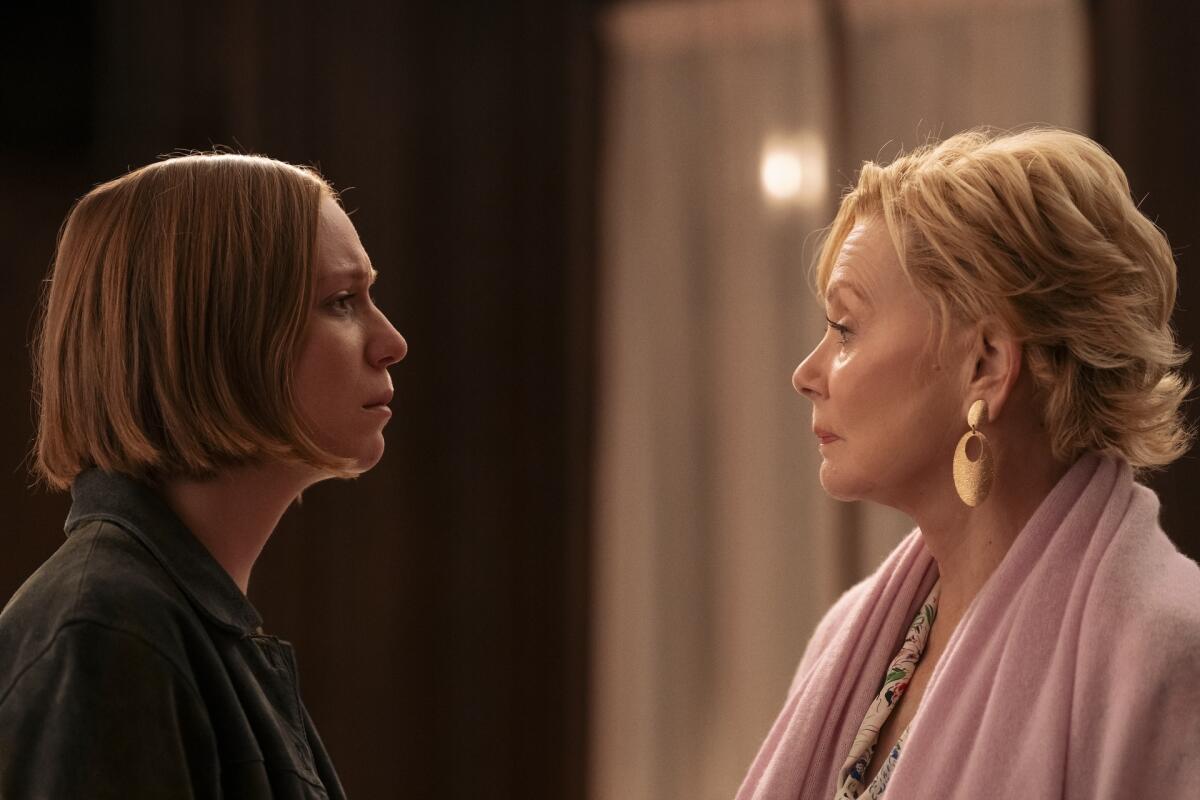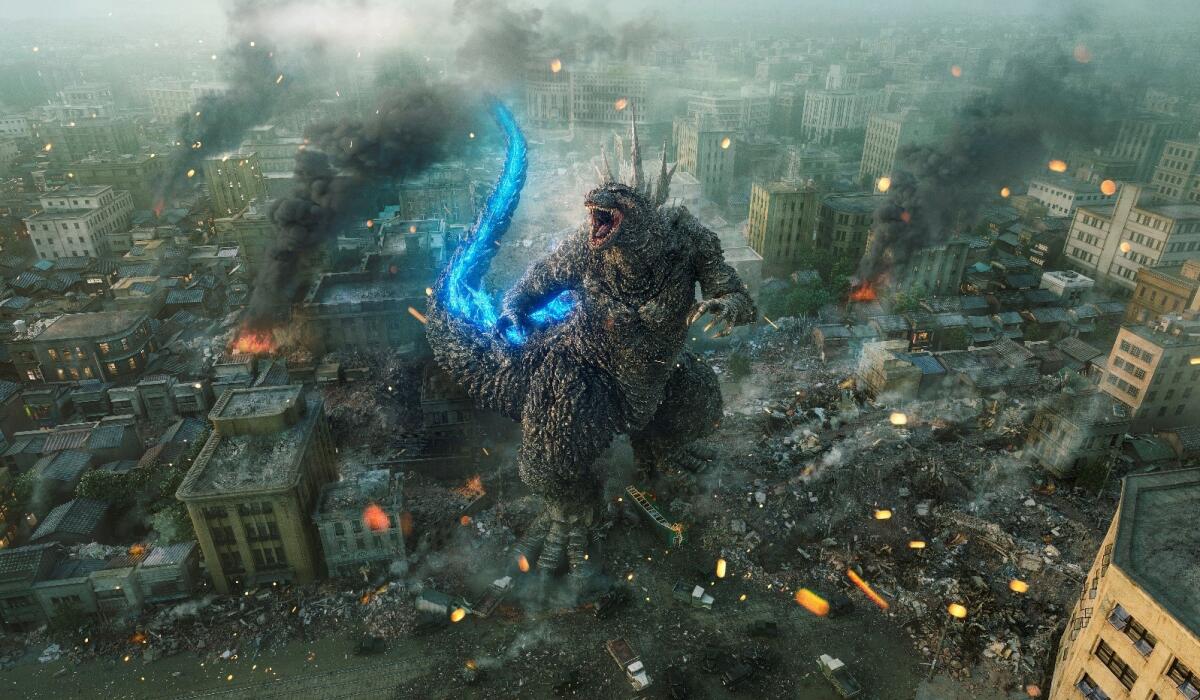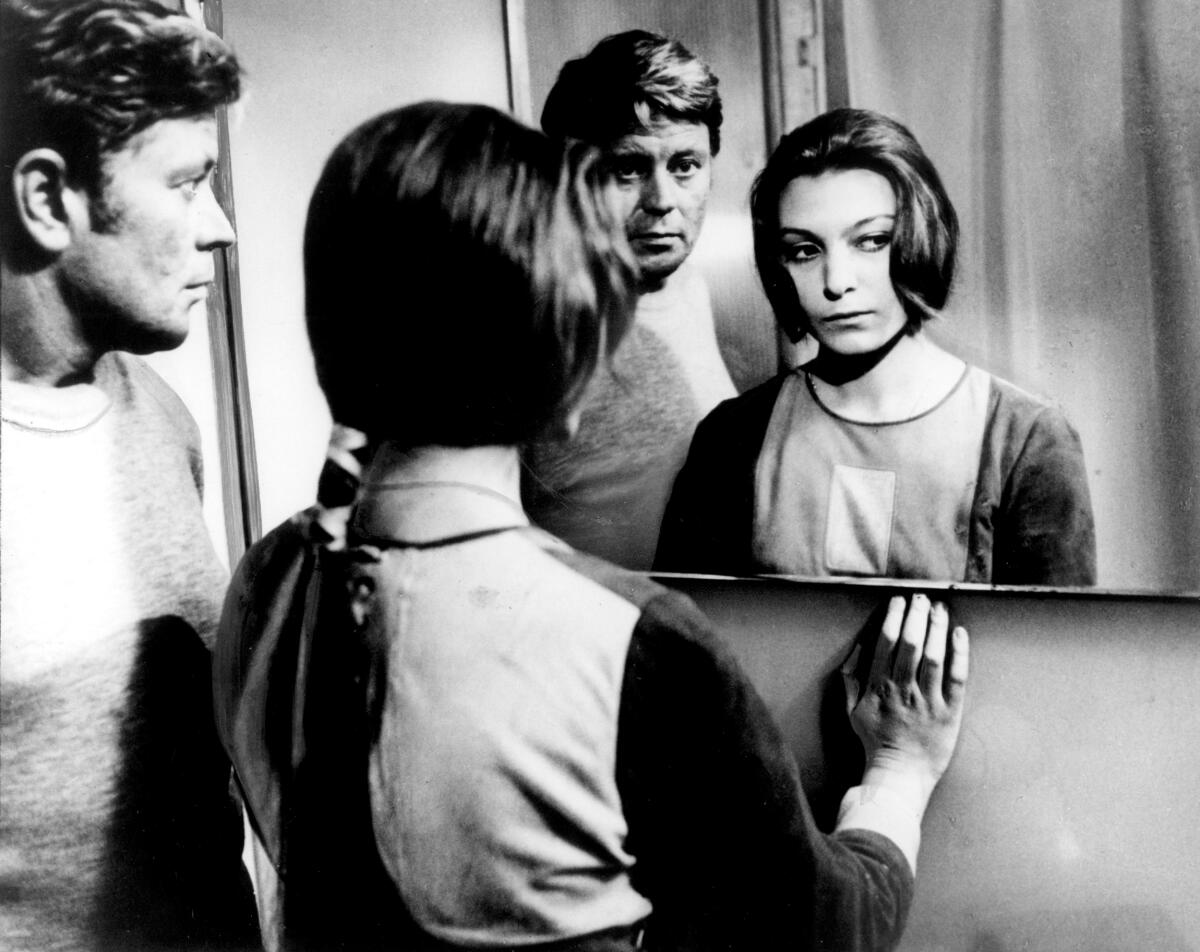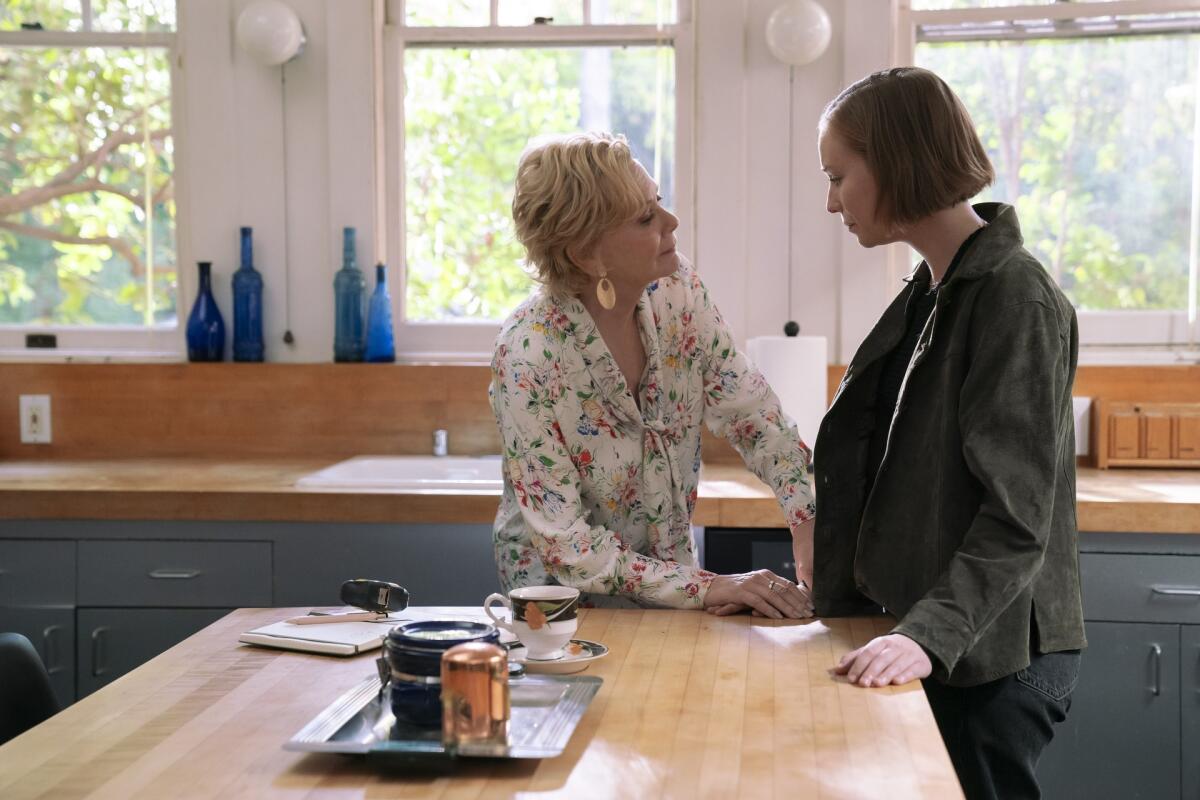How the ‘Hacks’ season finale threw the perfect left hook

Welcome to Screen Gab, the newsletter for everyone who needs “Late Night With Deborah Vance” to go into production immediately.
That’s because, as editor Matt Brennan writes in this week’s Screen Gab, the one-two punch of “Hacks” Season 3 finale sets up a delicious (and, phew, already official) Season 4 from Max’s backstage comedy, with stars Jean Smart and Hannah Einbinder ready to keep sparring. It can’t get here soon enough.
Also in Screen Gab no. 135, Bill Pullman stops by to discuss why he took on the role of true-crime sensation Alex Murdaugh and two movies to transport you this weekend.
You are reading Screen Gab newsletter
Sign up to get recommendations for the TV shows and streaming movies you can’t miss, plus exclusive interviews with the talent behind your favorite titles, in your inbox every Friday
You may occasionally receive promotional content from the Los Angeles Times.
ICYMI
Must-read stories you might have missed

We’ve been telling the wrong story about queer people in Hollywood: LGBTQ+ representation in film and TV is essential. But the way we’ve come to define, discuss and quantify it leaves out too much of the queer contribution to culture.
‘It’s the anti-grit show’: How CBS and the Kings landed a TV hit with ‘Elsbeth’: In this week’s episode of The Envelope, we’re joined by “Lessons in Chemistry” star Aja Naomi King and Michelle King and Jonathan Tolins, who are part of the team behind “Elsbeth.”
‘Acolyte’ stars Amandla Stenberg and Lee Jung-jae on ‘cosmic connection’ between Mae and Sol: Stenberg talks about playing twins Mae and Osha in Disney+’s new “Star Wars” series alongside Lee, who stars as Master Sol.
‘Stormy’ filmmakers explain how Daniels helped convict Trump: ‘Let’s give the woman her due’: Filmmakers Sarah Gibson and Erin Lee Carr spoke to The Times about Stormy Daniels, their recent documentary on her and her reaction to Trump’s trial.
Turn on
Recommendations from the film and TV experts at The Times

“Godzilla Minus One” (Netflix)
Last year’s phenomenally successful feature, the 37th in the Godzilla franchise, still makes a big impression streaming on the smaller screen. It’s a quasi-remake of the 1954 original, in its serious tone and story beats, though it’s set several years earlier, in the aftermath of World War II, with much of Tokyo still in rubble. Unlike in later films, when the giant fire-breathing lizard has become a national treasure, even an incidental defender of Japan from worse monsters, he’s just a big lone troublemaker marking his territory. And unlike the American Monsterverse franchise, including the Apple TV+ series “Monarch: Legacy of Monsters,” in which Godzilla plays a starring role, this is a standalone story without explicit reference to existing canon (and without Americans). In between attacks, we get an affecting human melodrama involving an airman suffering twice over from survivor’s guilt and the adopted family that falls in place around him. As always there’s a scientist with a plan. And as ever, one feels sympathy for Godzilla, who doesn’t like being shot at any more than would you or I. —Robert Lloyd

“Solaris” (The Criterion Channel)
If Andrei Tarkovsky’s 1972 space psychodrama is famous for anything, it’s for being that movie you’ve always meant to get around to: undeniably significant, with opening titles that play over a wheezing organ chorale by Bach, a piece of music that seems to encapsulate the whole of Soviet-era stasis in a musty three minutes. But everything that follows is astounding. The remainder of the “Solaris” soundtrack — an early piece of electronica — was composed by Eduard Artemyev, one of the last of the old-school state composers. (He died in 2022 at 85, a COVID casualty.) What he did for Tarkovsky’s film, placing it in an experimental aural soundscape of whirring analog washes and echoey chimes, represents a major elevation of science fiction in general and a big leap from Stanley Kubrick’s classicism. “Solaris” could become your new headphone jam on a June gloom L.A. morning. It’s playing in a series Criterion is calling “Synth Soundtracks.” All the entries are wonderful, this one especially. — Joshua Rothkopf
Catch up
Everything you need to know about the film or TV series everyone’s talking about

In the penultimate episode of “Hacks‘” stellar third season, legendary stand-up Deborah Vance (Jean Smart) and up-and-coming writer Ava Daniels (Hannah Einbinder) confront the entertainment industry’s No. 1 baddie: cancellation. Just as she’s about to land the late-night gig she’s coveted all her life, Deborah — in Berkeley to receive an honorary degree and shadowed by a New Yorker journalist — finds herself in a campus firestorm over a viral compilation of her most problematic material. An improv show, frat party and town hall later, though, and the dust has settled, with Deborah poised to accept her mantle and Ava to gain her biggest break yet. The smooth sailing is cause for such celebration that only the latter’s reference to the series’ title, in a surprisingly gooey quote from that New Yorker profile, pricked up my ears: “A hack is someone who does the same thing over and over. Deborah does the opposite. She keeps evolving and getting better.”
I should have known that Max’s Vegas-set comedy had another trick up its sleeve. After road-testing its central relationship at a comedy festival, in the wilderness and during an executive golf tournament this season — and expanding the storyline of spinoff-worthy talent managers Kayla (Megan Stalter) and Jimmy (Paul W. Downs) — “Hacks” returns to first principles in the finale, where Deborah and Ava face off in the former’s familiar estate. Co-creators Downs, Jen Statsky and Lucia Anello barely need their (always razor-sharp) zingers: With Einbinder’s wet eyes and a smirk from Smart to rival Brian Cox, the series wordlessly, expertly deflates the high of the previous episode, and sets up a fourth season I can scarcely wait for. Talk about getting better all the time. —Matt Brennan
READ MORE: With ‘Everything Must Go,’ Hannah Einbinder returns to her first passion: stand-up
Guest spot
A weekly chat with actors, writers, directors and more about what they’re working on — and what they’re watching

The case of Alex Murdaugh, convicted last year of murdering his wife and son, captivated a nation that has become deeply obsessed with true crime. But for Bill Pullman, who stars as the disgraced South Carolina attorney in Lifetime’s “Murdaugh Murders: The Movie” (Hulu), the appeal of the sordid tale is less what happened than how: Drawn from real-life sources, he says, the dialogue captures the fascinating sound of “people who are lying, or fishing out lies, or lying with no moral filter.” The veteran actor stopped by Screen Gab recently to discuss the “peculiar” details of the Murdaugh saga, the film he returns to time and again to calibrate his acting and more. —Matt Brennan
What have you watched recently that you are recommending to everyone you know?
On a plane a few months ago, I saw the 2011 Iranian drama “A Separation” [VOD, multiple platforms] which won the foreign-language film Oscar in 2012. It’s a story of a middle-class couple who are splitting up as they face a lot of pressures taking care of one’s father, who has dementia, and handling their 10-year-old daughter who is navigating the concerns of the parents while maintaining her own sense of truth. It builds to a critical scene in a crazy court situation when the child is called to state facts which would reveal that testimony by her father was false. It’s a killer of a scene on a lot of levels. Curiously, it’s a flip of my favorite scene in a movie last year: the French courtroom scene in “Anatomy of a Fall” [Hulu] when the young son of a woman who is accused of killing her husband is called to testify.
What’s your go-to “comfort watch,” the film or TV show you return to again and again?
Ha! I don’t watch movies to feel comfortable, necessarily. There is a movie I’ve watched more often than any other movie in the last few years which I turn to to calibrate once again what I believe are profound performances. “A Hidden Life” [Fubo] is an exquisitely painful historical drama written and directed by Terrence Malick. We watch a farm family living high in the idyllic Austrian Alps as World War II is about to explode the world. The father is a devout Catholic who refuses to fight for the Nazis. The extended journey is so quietly devastating, and the actors are so truthful it makes your teeth hurt.
Were you a true crime buff before you signed on to “Murdaugh Murders”? If so, what were you a fan of? If not, what convinced you to take on a project with this ripped-from-the-headlines sensibility?
I was drawn to “Murdaugh Murders” partly because of the structure of the sentences in many critical scenes. Much was taken verbatim from body cam recordings, courtroom testimony, etc. The word choice and syntax of people who are lying, or fishing out lies, or lying with no moral filter was one of my fascinations playing the detective with hidden proclivities in “The Sinner” (Netflix).
What single aspect of or detail from the case most shocked or disturbed you, as you prepared to play this character?
I think there are sections in “Murdaugh Murders” which seem so layered with specific details that are probable but so, so odd and peculiar. The night that the murders happen, the scene is a compound of dog kennels lit up with warehouse quartz halogen and revealed in many of the recording devices that were carried or were installed around the area. Eventually the investigators recovered footage from a Snapchat video that is just on a dog wagging its tail. At the same time you hear first the mother, then the son, and then the lower voice of the person who most needed not to be identified at the crime scene just minutes before the murders happened.
The complete guide to home viewing
Get Screen Gab for everything about the TV shows and streaming movies everyone’s talking about.
You may occasionally receive promotional content from the Los Angeles Times.






